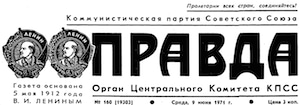
Growing up in the Soviet Union, I used to approach words like “Voice of America” (Golos Ameriki), BBC, Deutche Welle (Nemetskaia volna) with a certain reverence: they meant hidden, clandestine and therefore precious truth. Truth and news were not found in Pravda or Izvestia, regardless of the explicit claims of these newspapers’ titles; truth and news dwelled in the little short-wave radio, which would tell its eager audience what was really happening in the world.
Official Soviet press was notorious for its manipulation of facts, and even more so for its tendency to ignore particular issues altogether. Dissident activity, Israel, unrest in socialist countries—these stories were off-limit, unless the most vicious vitriol was thrown at them. This policy bordered on the ridiculous.
I learned since then that these radio stations were government-sponsored, that they rarely reported “the whole truth,” but still, the facts that they reported were sufficient to break through the all-encompassing fantasies created by the Soviet media.
With the recent crisis in Ukraine, and much to my dismay, I’ve begun to experience an eerie sense of déjà vu. It is as if I’m observing the good old days of the Cold War but through some distorted mirror. Too many major news organizations believe, rather naively, that simple echoing of their government lines will somehow work in the West, even though it failed in the Soviet Union. It is rather ironic that Secretary John Kerry has decided to make RT the subject of his criticism, by calling it the “propaganda bullhorn” echoing the accusations that good old Soviet apparatchiks would hurl at Voice of America.
The official line for the Ukrainian story has been already scripted: Ukrainian desire to embrace Western and democratic ways is blocked by spy-master Putin who utilizes his guile and aggression in order to restore the Soviet Empire. And therefore, any unexpected impediment in Ukraine’s march toward Europe is to be blamed on Tsar Putin. The concrete changes and challenges that time brings to this story are ignored, dismissed or misread. Be it the refusal to take Russian interests into consideration, or the causes behind Russia’s annexation of Crimea, or the Russophobic hysteria that keeps ostracizing large segments of the Russian-speaking Ukrainian population. Not to mention the current Ukrainian government’s heavy handed and violent tactics, including the military excursions into the east of the country that have pushed the country to the brink of civil war. All these unexpected events are set aside, while the wheels of the press keep on turning in the same rut and dutifully condemn Putin’s aggression, or articulate different ways of punishing Russia, or juxtapose thuggish Russian separatists with the benevolent and restrained Kiev regime.
(Fair use — read the rest of the article.)

